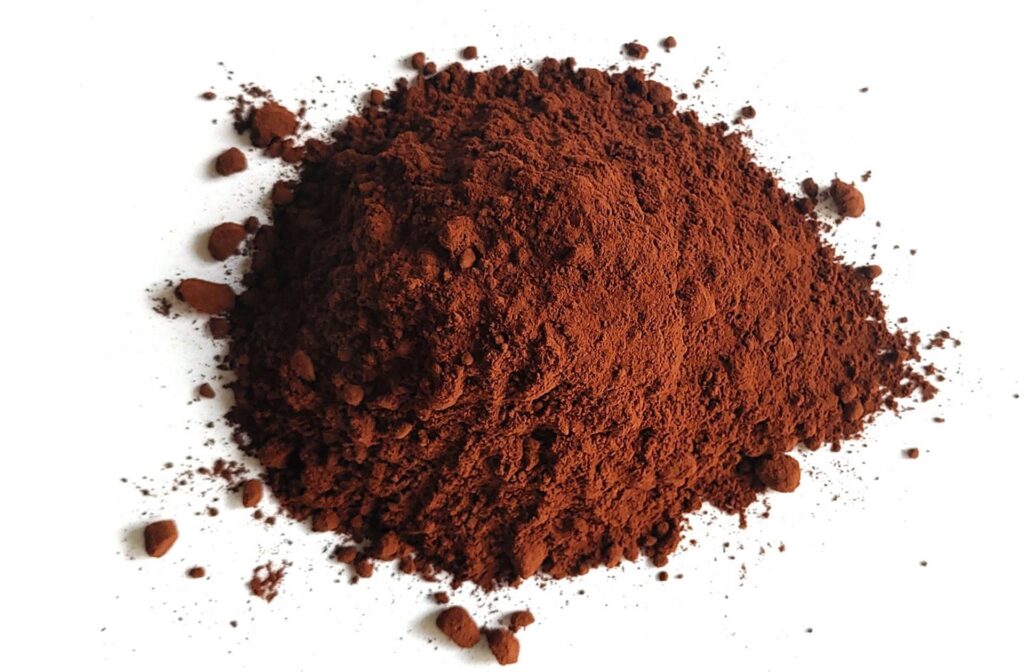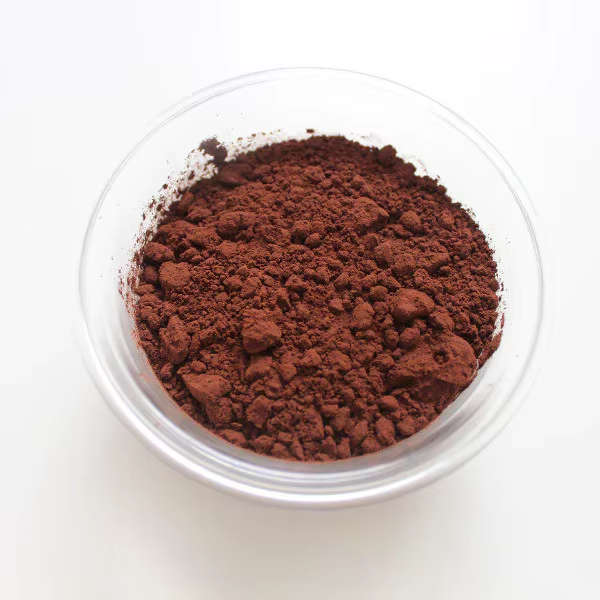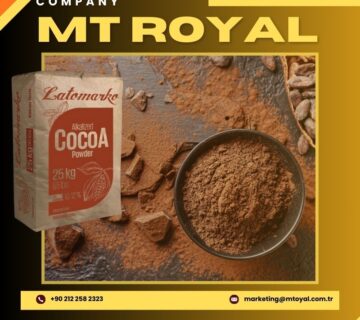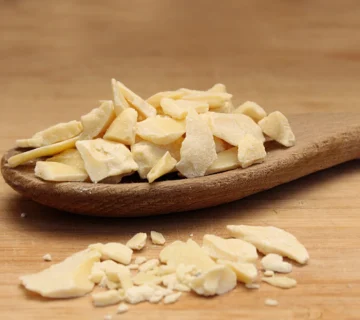In Egypt’s fast-evolving food manufacturing sector, cocoa powder stands as one of the most critical raw materials for large-scale production. Whether it’s a chocolate molding plant in Cairo, a biscuit manufacturer in 10th of Ramadan City, or a confectionery producer in Alexandria, the quality of cocoa powder influences everything from flavor profile and color consistency to texture and production efficiency.
For manufacturers, sourcing the right cocoa powder isn’t just about taste—it’s about process reliability, product uniformity, and cost efficiency. Choosing a reliable alkalized cocoa powder supplier in Egypt can dramatically affect yield stability, storage behavior, and overall production outcomes.
At MT Royal, we’ve worked closely with factories across Egypt and the wider MENA region, helping them source high-quality cocoa ingredients that meet industrial standards. Our partnerships span both regional and international brands, ensuring that manufacturers can access premium-grade powders suitable for various production needs—from bakery mixes and coatings to instant beverages and chocolate bars.
Understanding Alkalized Cocoa Powder: The Foundation of Industrial Chocolate and Bakery Production
Alkalized cocoa powder, often called “Dutch-processed cocoa,” undergoes a specialized treatment with mild alkalis such as potassium carbonate. This process neutralizes cocoa’s natural acidity, enhances its color, and smooths its flavor.
For industrial manufacturers, the advantages of alkalized cocoa powder include:
- Reduced bitterness and improved flavor balance
- Darker, more uniform color ideal for chocolate coatings
- Improved dispersibility in liquid and dry blends
- Better performance in automated mixing and high-speed production lines
From a manufacturing standpoint, these properties allow for repeatable results, stable emulsification, and reduced waste during blending. This makes alkalized cocoa powder particularly valuable for large-scale operations that require batch-to-batch consistency.
The Egyptian Market: Evolving Demand and Supply Challenges
Egypt’s food industry has expanded rapidly over the past decade, supported by domestic consumption and export-oriented growth. However, raw material sourcing remains a critical challenge, particularly for cocoa-derived products which depend heavily on imports.
Most cocoa powder used in Egypt is imported from international processors in West Africa, Europe, and Asia, where raw cocoa beans undergo fermentation, roasting, and alkalization. Local manufacturers must therefore navigate:
- Currency fluctuations affecting import costs
- Variable lead times for international shipments
- Quality inconsistencies between suppliers
- Storage and handling issues due to temperature sensitivity

Why Alkalized Cocoa Powder Is Preferred in Industrial Settings
Unlike natural cocoa, alkalized cocoa offers predictable performance during processing. This consistency is crucial for industrial environments, where downtime or quality deviation can translate to significant financial losses.
Let’s break down its benefits across key manufacturing applications:
1. Chocolate and Compound Coatings
Factories producing compound chocolate, enrobed biscuits, or confectionery fillings need powders with stable color and controlled pH. Alkalized cocoa ensures smoother texture, lower viscosity, and easier integration with fats and sugars.
2. Bakery and Cake Mixes
Alkalized cocoa’s reduced acidity prevents interference with leavening agents like baking soda, leading to balanced flavor and consistent rise in cakes and muffins.
3. Instant Beverages
For powdered drinks or chocolate milk formulations, alkalized cocoa dissolves faster and blends more evenly, ensuring minimal sedimentation during production or consumer use.
4. Ice Cream and Dairy Applications
The neutral flavor and rich brown color enhance both visual appeal and compatibility with dairy fats, making alkalized cocoa a preferred choice for frozen desserts and flavored yogurts.
Selecting the Right Supplier: A Strategic Procurement Perspective
For factory managers and procurement teams, supplier selection is not only about price—it’s about operational reliability and technical compatibility. Here are some key evaluation metrics used by leading Egyptian manufacturers:
| Evaluation Factor | Why It Matters | Ideal Supplier Trait |
|---|---|---|
| Consistency | Ensures uniform flavor and color in every batch | Proven QA/QC procedures |
| Supply Continuity | Prevents production delays | Reliable logistics and inventory |
| Technical Support | Optimizes production use | Supplier with industrial expertise |
| Product Range | Enables formulation flexibility | Multiple brands and grades |
| Cost Efficiency | Maintains competitiveness | Balanced pricing strategy |
At MT Royal, we understand these procurement priorities firsthand.
We’ve seen factories optimize both performance and cost by consolidating their cocoa sourcing through a single, dependable distributor. Our approach is built around offering tailored options—from entry-level industrial powders to premium European grades like Latamarko, known for exceptional color consistency and smooth processing behavior.
Latamarko: The European Benchmark in Cocoa Engineering
Spanish engineering has earned a global reputation for precision and reliability, and Latamarko exemplifies this tradition. Known for its fine particle size, rich flavor intensity, and stable pH balance, Latamarko’s alkalized cocoa powders are widely used in high-end confectionery and bakery industries.
In Egypt, manufacturers adopting Latamarko-grade powders report measurable improvements in:
- Color uniformity across production runs
- Reduced dusting during handling
- Enhanced emulsification in compound chocolate
- Longer shelf stability in humid environments
When comparing Latamarko with lower-grade alternatives, the difference lies not just in flavor—but in processing efficiency. Each kilogram of high-quality cocoa powder that blends faster or reduces machine cleaning downtime translates directly into saved labor and operational costs.
Common Pitfalls in Cocoa Procurement
Even experienced procurement teams sometimes encounter avoidable issues. Below are some typical pitfalls we’ve observed in the Egyptian industrial market:
- Overemphasis on Price per Ton
Cheap cocoa powder can cause machine fouling, uneven mixing, or off-flavors, which lead to higher long-term costs. - Ignoring pH Compatibility
Different production lines (especially for beverages or bakery) require specific pH levels for optimal results. Using an unsuitable grade can destabilize emulsions or affect taste. - Inadequate Storage Conditions
Cocoa powder is hygroscopic. If stored in humid conditions, it can clump or absorb odors—impacting end-product quality. - Lack of Supplier Traceability
Without full traceability, it’s hard to ensure food safety compliance during audits or exports.
MT Royal’s approach helps mitigate these risks through transparent sourcing, quality verification, and ongoing support—ensuring manufacturers always receive products matched to their process requirements.
Best Practices for Industrial Cocoa Powder Handling
Once sourced, proper handling and storage are equally vital for maintaining product quality.
Key recommendations include:
- Store between 18–24°C in a dry, odor-free area
- Avoid direct sunlight or contact with concrete surfaces
- Rotate inventory (FIFO method) to ensure freshness
- Use sealed, food-grade containers to prevent contamination
Many Egyptian factories have optimized shelf life and product integrity simply by improving their warehouse airflow or humidity control, leading to measurable reductions in waste.
MT Royal’s Role in Egypt’s Cocoa Supply Chain
At MT Royal, our mission is to bridge global manufacturing excellence with local production needs.
We collaborate with both multinational chocolate brands and local producers, supplying a curated portfolio of alkalized cocoa powders tailored for diverse applications.
We’ve helped Egyptian factories achieve:
- Greater supply chain resilience through reliable import coordination
- Operational flexibility with multiple cocoa grades for different lines
- Technical support in selecting optimal alkalization levels for recipes
In our experience, manufacturers that approach sourcing as a strategic partnership—rather than a simple transaction—gain significant competitive advantages in efficiency and end-product consistency.
FAQ: Questions from Egyptian Manufacturers
Q1: What is the difference between natural and alkalized cocoa powder?
Alkalized cocoa undergoes pH adjustment during processing, resulting in smoother taste and darker color, ideal for industrial uses.
Q2: Does alkalized cocoa affect leavening in bakery production?
Yes. Since it’s neutralized, it doesn’t react with baking soda, providing better control over cake rise and texture.
Q3: How can I ensure consistent quality from batch to batch?
Partnering with a verified supplier like MT Royal ensures every shipment meets the same technical specifications and quality parameters.
Q4: What’s the ideal moisture level in industrial cocoa powder?
Typically below 5%, ensuring extended shelf life and stable blending performance.
Q5: Which brands are most trusted by manufacturers in Egypt?
European-origin brands such as Latamarko are highly regarded for precision and reliability, especially in premium product lines.
Final Insight: Quality Is the True Cost Advantage
In manufacturing, every decision eventually shows up on the production floor. Choosing a reliable alkalized cocoa powder supplier in Egypt means investing in predictable performance, smoother operations, and fewer quality issues down the line.
At MT Royal, we believe that long-term success for manufacturers depends on stable ingredient partnerships.
Whether your facility is optimizing a chocolate formulation, improving beverage solubility, or enhancing bakery mixes, the right cocoa powder makes all the difference.
After all, consistency isn’t a luxury—it’s the foundation of industrial excellence.
latamarko alkalized cocoa powder lm60
cocoa powder for chocolate production-Best price
Food industry raw materials – list of products
Types of Gelatin from Turkish Manufacturer
Alkalized Cocoa Powder Bulk Supplier






No comment